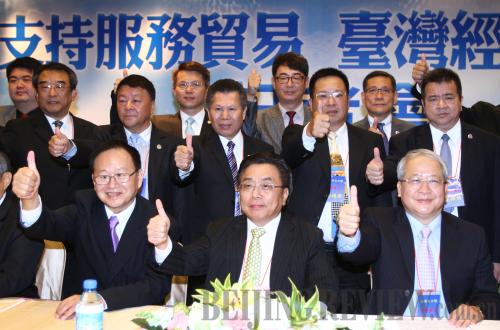|
 |
|
ALL IN FAVOR: Taiwanese entrepreneurs doing business on the mainland show their support of the CSSTA while meeting the press in Taipei in October 2013 (IC) |

The Cross-Straits Service Trade Agreement (CSSTA) should come as more favorable news regarding the sustainable development of Taiwan, and it will bring more benefits to Taiwan than to the mainland. It is not hard to understand why.
The agreement is important to Taiwan—an economy mainly relying on its service industry. In 2012, the service industry accounted for 69.2 percent of its GDP, and 58.8 percent of Taiwanese work in the sector. The average wage of Taiwan's service industry is also higher than those in other industries. Against this backdrop, both sides across the Straits must create a better environment for service trade so as to ensure cross-Straits trade can come into full play in stimulating economic development on both sides and benefit Taiwan's economy. Since the trade volume of goods between the two sides is already huge, reaching $197.3 billion in 2013, the focus of future cross-Straits trade must be on services. The development of service trade will also deepen cooperation in trade in goods and improve the efficiency of the process.
The bigger beneficiary
The CSSTA will benefit Taiwan because the Chinese mainland has a larger and more stable economy than Taiwan. Even though the two sides were equally open to each other, Taiwan's industries and the whole economy would benefit much more than the mainland. In 1997, when Asian financial turmoil broke out, the Chinese mainland's GDP was 3.2 times that of Taiwan, and by 2012, this gap had widened to 16.8 times. Four mainland provinces—Guangdong, Jiangsu, Shandong and Zhejiang—had their GDP exceed that of Taiwan in 2012. Fujian Province, just opposite the Taiwan Straits, had a total GDP that was only 38 percent of Taiwan's in 2008, but in 2012, Fujian's GDP had risen to 64 percent of that in Taiwan. Meanwhile, in 2012, six provincial-level regions on the mainland had a per-capita GDP of more than $10,000. Their population totaled 217 million, 9.4 times that of Taiwan.
In terms of economic stability, Taiwan underwent a recession in both 1998 and 2009, while the mainland's economy has continued to grow unabated. In fact, by the time the Asian financial crisis was in full swing between 1997 and 1998, the Chinese mainland had already started to act as a stabilizer to the overall economy in East Asia. In the wake of the U.S. sub-prime crisis and the European sovereign debt crisis, China has played a similar role as a stabilizer to the global economy.
Entering the 21st century, the Chinese mainland has become a major source of global economic growth. Its contribution to world economic growth has reached 30 percent. Now, the world economy is in a period of low growth and the mainland's economic growth has also slowed down. However, it still boasts the highest growth rate among major economies. As a market with the world's second largest economic scale, the highest growth rate and a high level of stability, the Chinese mainland is of indubitable significance to any globally operating industry or individual corporation in the world today. For a latecomer in an industry, if it hopes to effectively improve its position, the best way is to be the first to enter and occupy a large market of high growth. By gaining a high market share and unshakable position in this market with comparatively mild competition, the latecomer can enhance its position in the industry, as the market has a much bigger share globally. By tapping the mainland market, for example, the Ting Hsin International Group, once unknown in the Taiwan food industry, has surged to become the top food company in Taiwan.
|
